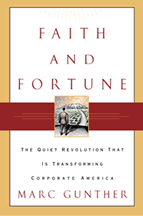
The views of a University of Notre Dame management professor on the interplay between religious values and the world of business are featured in a new book by Fortune magazine senior writer Marc Gunther.
Titled “Faith and Fortune: The Quiet Revolution to Reform American Business,” the book tells the stories of corporate leaders who are at the forefront in building businesses in which profits and values coexist.
To better understand the role of religious faith in the development of ethical executives, Gunther interviewed experts from three faith traditions, including Rev. Oliver F. Williams, C.S.C., associate professor of management at Notre Dame and director of the Universitys Center for Ethics and Religious Values in Business.
“I felt sure that religion has useful things to say to businesspeople,” Gunther writes in the chapter titled "A Priest, a Minister and a Rabbi. “After all, most big companies disappear or die within a span of forty or fifty years By contrast, Christianity has endured for two thousand years and Judaism has been around for even longer. They have proven that they can adapt to changing markets. I decided to seek out a priest, a minister and a rabbi who had thought about business. If nothing else, they would know something about sustainability, I figured.”
Among the issues he explored with Father Williams was the change in Catholicisms position on business – from the medieval belief that commerce was “at best tolerable and at worst pernicious,” to a fundamentally favorable view. Citing two influential documents on the subject – the U.S. Catholic Bishopspastoral letter “Economic Justice for All,” written in 1986, and Pope John Paul IIs encyclical “Centesimus Annus” five years later – Father Williams said a “sea change” in Catholic social teaching has rejected socialism in favor of capitalism, but only a capitalist model in which business and the economy serve humanity, not vice versa.
“Im going to go to the wall over saying that the priority of labor over capital is a good principle, and is rock bottom, and is never going to change,” Father Williams told Gunther.
As part of his research, Gunther attended Father WilliamsMBA class, titled “Business, Religion, and Spirituality.”
Father Williams has directed the Center for Ethics and Religious Values in Business since its establishment in 1978. He specializes in understanding how the ethics of virtue might inform the ethical conduct of managers and is the author or editor of 14 books.
Also featured in the chapter titled “A Priest, a Minister and a Rabbi” are Max Stackhouse, Stephen Colwell Professor of Christian Ethics at Princeton Theological Seminary and an ordained minister of the United Church of Christ, and Rabbi Fred Scherlinder Dobb of the Adat Shalom Reconstructionist Congregation in Bethesda, Md.
TopicID: 8301